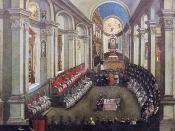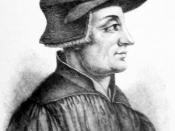Arising out recent class discussion topics touching on the ideas of James Cone's ideas on Liberation Theology and the relationship between the Cross and the Lynching Tree, our group decided to focus the topic of our presentation around Liberation Theology. However, in order to create a counter argument to stimulate further discourse, we introduced the Theology of Prosperity, as an opposing theological concept, to our presentation. Hence, we came up with the topic of Liberation Theology vs. Theology of Prosperity.
There were various theologies of the sacrament of Holy Communion that were being debated during the Reformation. Among reformers there were conflicting views on transubstantiation, consubstantiation, infant baptism and Christ's importance of being in communion overall. Some reformers and reformation events that appealed believers more than others were Martin Luther, Ulrich Zwingli, John Calvin and the Council of Trent.
Martin Luther was a German priest who rebelled against authorities of the Roman Catholic Church and initiated the start of the reformation.
He rejected some of the traditional practices although he believed that the church was essential to the Christian doctrine. He was very big on communion with God. He believed that people of God were a part of a community of belief and being honest and just in that community made you equally seen to God. Through and in the church we receive sacraments that give us the Word of God. Luther felt that for a sacrament to be true, it had to come from Christ and be a sign of the promise of the gospel.
The book of Job provides a vivid illustration of the theology of suffering. In the beginning of the book, Job's blessings are apparent. He possesses a large family, good health, many servants, flocks of multiple species of livestock, and is considered the greatest...


